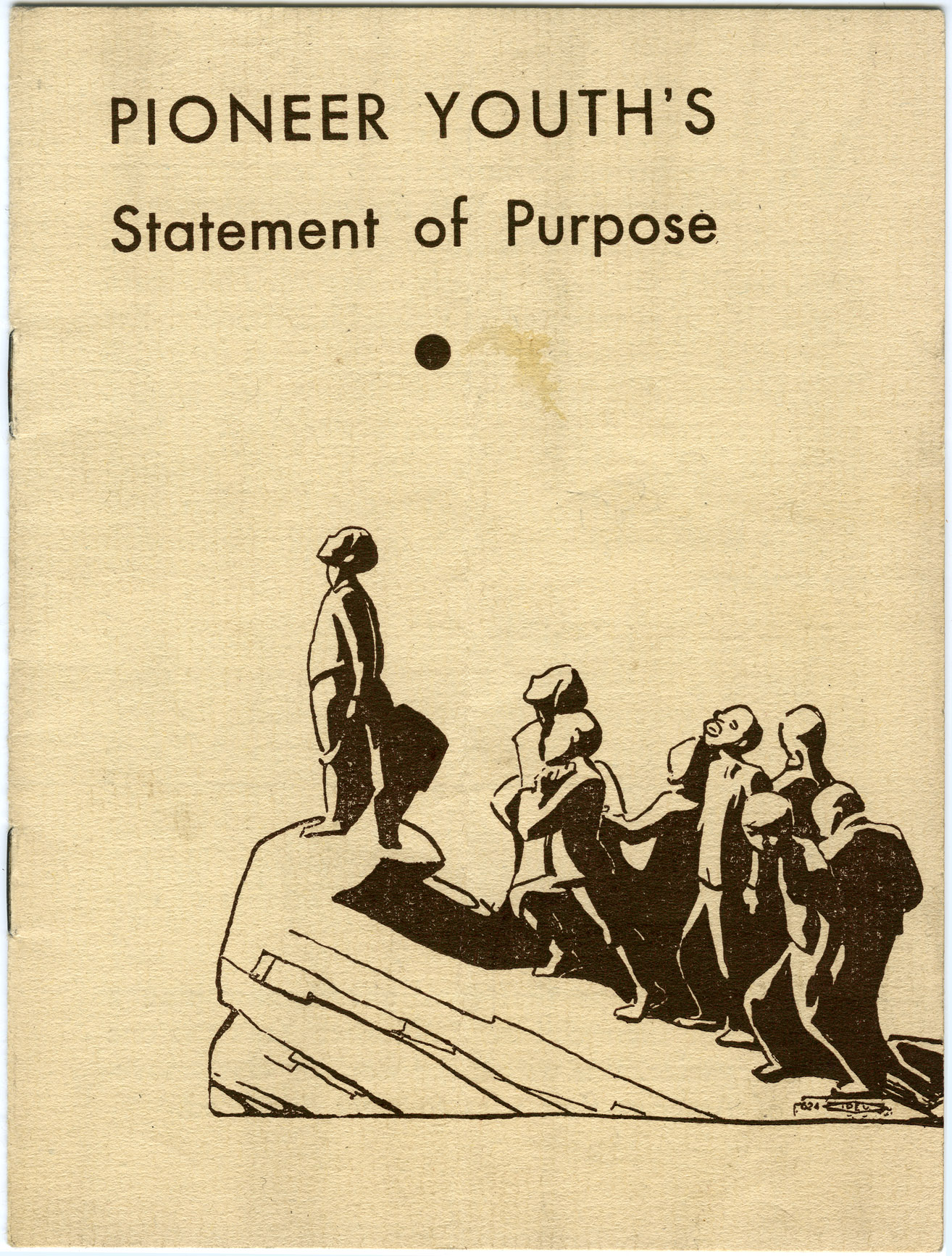Background on August Meier

Pioneer Youth statement of purpose
A noted scholar of African American history and civil rights activist, August Meier was born in Newark, N.J., on April 30, 1923. Raised in an intellectually demanding, politically-engaged family, Meier and his younger brother Paul were steeped in progressive, assimilationist ideals by their father, Frank, a chemist with the American Platinum Works and son of a German Socialist, and mother Clara, a public school teacher and principal who had come from a family of radical Eastern European Jewish intellectuals. Although set apart from his peers by his intellectual interests and taste for high culture in music, August found a firm foundation for his future self through a summer camp in Rifton, New York, operated by the Pioneer Youth of America. Years later, he recalled the camp fondly:
"Beginning when I was eleven, I spent a half-dozen summers during the years 1934-1939. Pioneer Youth of American had been founded in 1924 by a heterogeneous group of reformers -- anarchists, Communists, socialists, pacifists, union leaders in the garment trades, liberals and, very important, Progressive educators... The progressive education orientation led the camp to emphasize individual freedom, and to adopt a practice of having the campers themselves decide democratically on what their activities would be. Thus, as much as possible, decisions about what was done were in the hands of the children rather than their counselors."
This intellectual freedom allowed Meier to pursue reading instead of the more usual summer fare, and the camp exposed him both to an egalitarian interracial community and to the fractiousness of leftist politics. In 1938, he was witness as Communists sought to wrest control of the camp from the liberals and Socialists, and although the attempt was unsuccessful, Meier felt "the Communists' ouster took away something of the liveliness of the camp." As he later told a friend Lloyd Saletan, the camp wandered "considerably to the right" thereafter, even as it remained a "good old liberal" place, "you know, trade unionish, democratic, and progressive." Still admiring its "marvelous spirit" and "its freedome of expression, its application of its interracial ideals, etc.," he returned to the camp as a counselor in 1944-1946, with his mother serving as Camp Director in the latter year (letter to Lloyd Saletan, 1943 April 10).
Meier's entry into academia began with his enrollment at Oberlin College in 1940. Originally a music major, he soon switched to double major in philosophy and history to feed his growing interest in the "Negro question," an interest which occupied his energies for the remainder of his life. During a one-year hiatus from his studies in 1942-1943, Meier returned to Newark to work with the War Department Office of Dependency Benefits, where nearly a third of his co-workers were African American. Classified 4F for the draft due to poor vision, he returned to Oberlin to complete his undergraduate studies and devoting himself increasingly to active opposition to segregation. Discrimination in the dormitories led Meier and his brother to join a group of African American students to move off campus to share room and board. He described his experiences to a friend, Neil:
"Somehow we don't discuss metaphysical or other philosophical problems -- nor even problems such as Socialism or Communism, or the Post-War World of what have you. Nor do we discuss girls all the time either. We do sometimes of course, but quite naturally one of our biggest topics of discussion is the race question. Frankly I have become very radical about it myself... This year has been then full of a number of new experiences." (letter to Neil, Jan. 3 1943 [i.e. 1944?])
Meier's activism at Oberlin extended to protesting discrimination in local barbershops and holding interracial dances -- carefully planned to avoid violent white reaction and the College's disapproval. As he drifted from the Socialist idealism of his youth, becoming more skeptical and cynical and less wedded to Marx, Meier wrote that he was "orienting myself rather rapidly to a life work, at least I hope I am. For I have become exceedingly interested in the field of Race Relations, particularly the Negro, and Negro History, Sociology, etc. in general."
Meier went on to complete a master's degree (1949) under Henry Steele Commager at Columbia University, followed by a doctorate (1957) that was published as Negro Thought in America, 1880-1915: Racial Ideologist in the Age of Booker T. Washington (1963). He held a succession of academic positions at Historically Black Colleges, including Tougaloo (1945-1949), Fisk (1953-1956), and Morgan State (1957-1964), before joining the faculty at Roosevelt University (1964-1967) and finally, Kent State (1967-1993). In each position, he was active in civil rights work, serving as Secretary of the Newark NAACP in 1951-1952 and 1956-1957, as a member of the Baltimore Chapter of SNCC (1960-1963), a member of CORE (1963-1964), and as an advisor to non-violent student protests at Morgan State.
Throughout, Meier remained highly productive as a scholar, writing or editing eleven books with his colleague Elliott Rudwick, and serving as editor of the Negro in American Life series for Athenaeum (1966-1974), for the long-running Blacks in the New World series for the University of Illinois Press. With his former student John Bracey, Meier co-edited two landmark series: the Bobbs-Merrill Reprints in Black Studies (1966-1974) and the Black Studies Research Sources: Microfilms of Materials in Major Archival Manuscript Collections produced by University Publications of America (1983-1998). After several years of impaired health due to a series of strokes, August Meier died in New York City on March 19, 2003.

